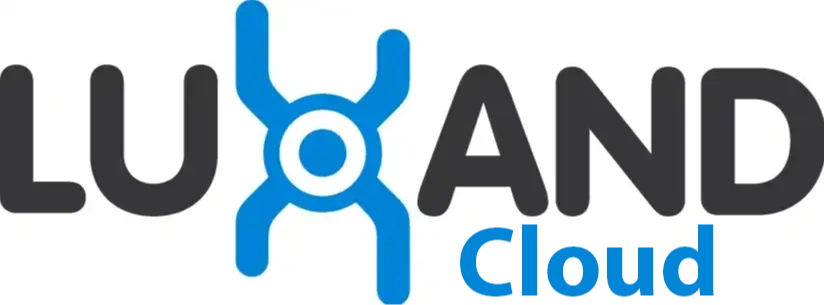
Top Fraud Detection Solutions 2024
Imagine a scenario where a rapidly growing e-commerce company is experiencing an increase in fraudulent transactions. Despite having basic security measures in place, they are facing sophisticated scams that are not only affecting their bottom line but also damaging their reputation. The CEO realizes the need for a robust fraud detection system that can adapt to evolving threats and protect their customers’ data.
The company’s CTO (chief technology officer) starts researching the latest advancements in fraud detection technology. The goal is to find the most suitable options that align with the company’s specific needs and budget.
This blog will provide the CTO (or any other stakeholders) with an in-depth analysis of the most effective solutions available, highlighting features like real-time transaction monitoring, AI-driven anomaly detection, and multi-layered authentication processes.
What Are Fraud Detection Solutions?

Fraud detection solutions are systems and tools designed to identify and prevent fraudulent activities within an organization or its transactions. These solutions utilize various technologies, including artificial intelligence (AI), machine learning, data analytics, and predictive modeling to analyze patterns and spot anomalies that may point to fraudulent behavior.
Fraud detection solutions scrutinize the authenticity of transactions and activities by comparing them against a database of known fraudulent patterns or by identifying irregularities that diverge from typical behavior. They can flag or block suspicious activities for further investigation.
Fraud Detection Application Areas
E-Commerce. Fraud detection technologies in the e-commerce sector are essential for detecting and preventing various types of fraudulent activities. These include payment fraud, where unauthorized transactions are identified and stopped; account takeovers, where fraudsters gain access to legitimate user accounts; and the creation of fake accounts, which can be used for a variety of malicious purposes such as exploiting promotional offers. Additionally, fraud detection tools help in mitigating return fraud, where customers might exploit return policies, and protecting customer data from unauthorized access.
Banking and finance. In the banking and finance industry, fraud detection is crucial for maintaining the integrity and security of financial transactions. Technologies are used to identify credit card fraud by monitoring transactions for unusual activity and unauthorized use. Fraud detection systems also help in spotting insurance claim fraud, where false claims are made to receive unwarranted payouts. Furthermore, these technologies are vital in combating money laundering by analyzing financial transactions for patterns indicative of illicit activities, ensuring compliance with regulations and protecting financial institutions from being exploited by criminals.
Healthcare. Fraud detection in healthcare is vital for maintaining the integrity of medical and insurance systems. Technologies are employed to spot fraudulent insurance claims, where services are overbilled or claimed for procedures not performed. Prescription fraud is another area of concern, where medications might be obtained illegally through forged or fraudulent prescriptions. Additionally, fraud detection helps in preventing medical identity theft, where a person's health information is used fraudulently to receive medical services or benefits, thereby protecting patient data and ensuring accurate medical records.
Government services. In government services, fraud detection technologies play a key role in ensuring compliance and fairness in various public systems. These technologies are used to detect tax evasion, where individuals or businesses might underreport income or inflate deductions to reduce tax liabilities. Fraud detection also extends to identifying fraudulent claims for social benefits, such as welfare or unemployment assistance, ensuring that resources are distributed to those who are genuinely eligible. Additionally, it helps in preventing fraud in public procurement processes by identifying and mitigating corrupt practices.
Fraud detection systems are essential for preserving the integrity of business operations in a variety of industries, defending financial assets, and securing client data.
How do Fraud Detection Solutions Work?
Consider a bank that has implemented a fraud detection solution. A customer’s account had a number of transactions that the system detected as out of the ordinary for them. The consumer has never made high-value transfers to a foreign account prior to these activities.
The bank’s fraud team looked into the alert and got in touch with the consumer after learning that they had not approved the transactions. It was discovered that the customer’s account information had been accessed via a phishing attempt. By stopping the transactions, the bank was able to safeguard the customer’s funds and avoid a large financial loss.
Fraud detection solutions work by employing a combination of advanced technologies to monitor, analyze, and flag potentially fraudulent activities. Here’s how they typically operate.
Data collection. The system gathers data from various sources, including transaction details, user behavior, and historical records.
Data analysis. Using machine learning algorithms, the system analyzes the data to identify patterns and anomalies.
Real-time monitoring. Transactions and activities are monitored in real-time, allowing for immediate detection of suspicious behavior.
Alert generation. When a potential fraud is detected, the system generates an alert. These alerts can be configured to trigger different responses, such as blocking a transaction or flagging it for review.
Investigation and feedback. Analysts review the alerts to confirm fraud. The outcomes of these investigations feed back into the system to improve its accuracy.
The Best Fraud Detection Solutions 2024
As we look at the top fraud detection solutions in 2024, it is clear that the industry has made significant strides. These solutions stand out for their advanced analytics, machine learning algorithms, and the ability to provide real-time protection against a wide array of fraudulent activities. With features like biometric authentication, behavior analysis, and deep learning, they represent the cutting edge of fraud prevention technology.
Luxand.cloud Fraud Detection Solution
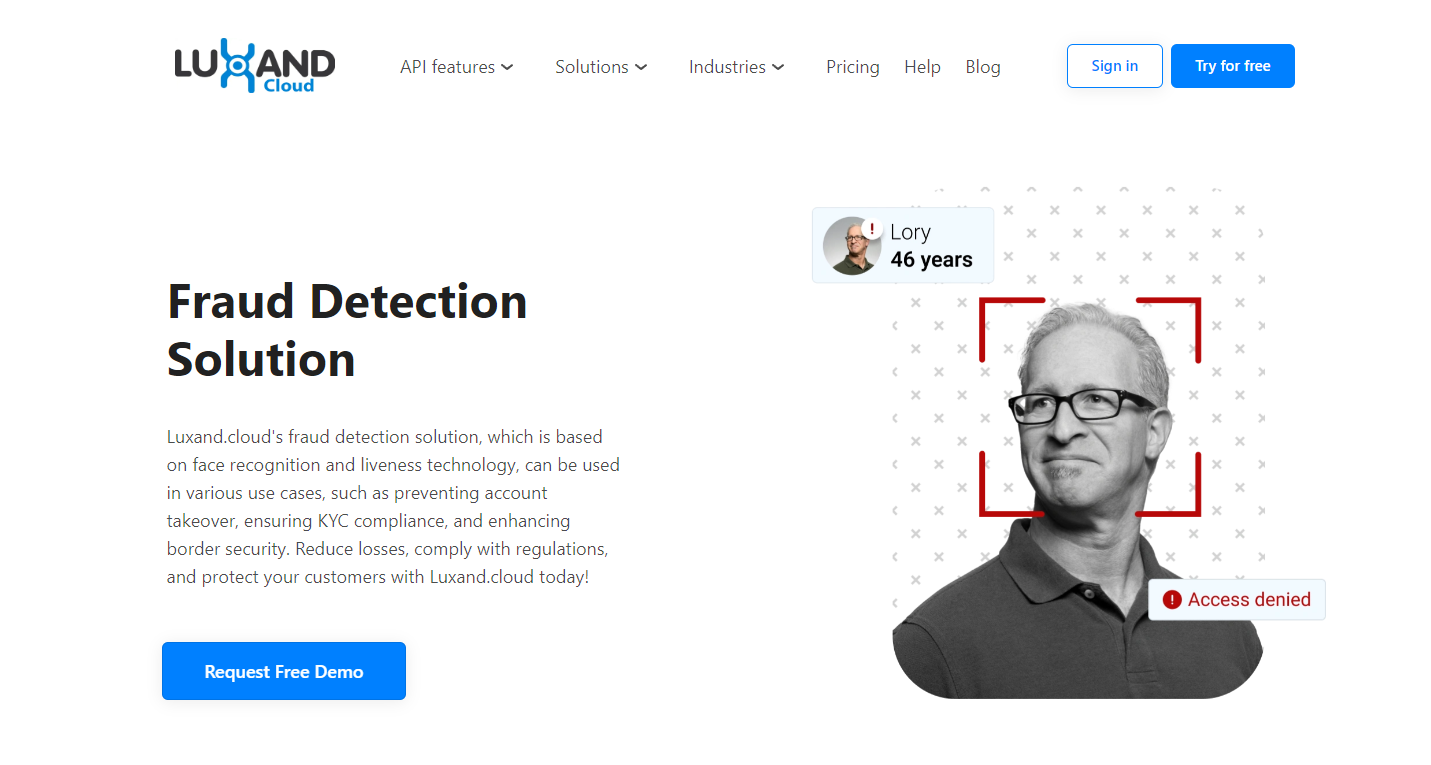
Luxand.cloud's fraud detection solution is a robust tool equipped with an array of sophisticated features engineered to combat fraudulent activities effectively. Powered by state-of-the-art facial recognition technology, Luxand.cloud offers unparalleled accuracy in identifying and verifying users, significantly reducing the risk of fraudulent transactions.
One of its standout features is advanced biometric authentication, which ensures secure access to sensitive data and transactions. By analyzing facial features in real-time, Luxand.cloud verifies the authenticity of users, preventing unauthorized access and thwarting fraudulent attempts.
Moreover, Luxand.cloud's seamless integration capabilities enable easy implementation into existing systems, minimizing disruption to operations. Its user-friendly interface streamlines the fraud detection process, empowering businesses to navigate through alerts and insights effortlessly.
With Luxand.cloud, organizations can enhance their fraud prevention efforts while providing a frictionless user experience. By leveraging the power of facial recognition and AI technology, Luxand.cloud equips businesses with the tools they need to stay ahead of evolving threats and safeguard their assets effectively.
SEON

SEON is a fraud detection platform that specializes in real-time analysis to help businesses combat fraudulent activities.
SEON gathers data from various sources to create comprehensive user profiles, helping identify anomalies that could indicate fraudulent behavior. The platform employs advanced machine learning models, learning from historical data to detect fraud patterns. SEON's strength lies in its ability to analyze transactions and user behavior in real-time, providing immediate feedback on the risk level of each action. Users can set specific rules that align with their company’s risk tolerance and profile, allowing for tailored fraud detection mechanisms.
By focusing on these aspects of fraud detection, SEON provides an efficient tool for businesses looking to protect themselves from the financial and reputational damage.
Sumsub
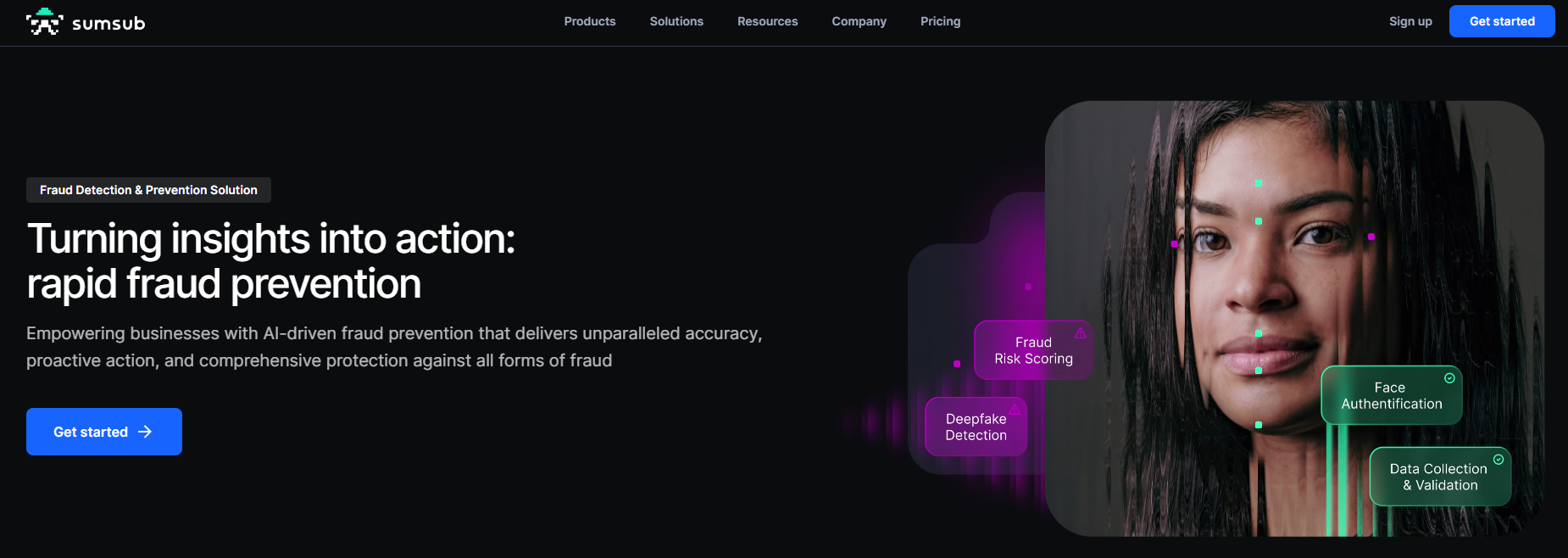
Sumsub ensures secure user identity verification by checking government-issued IDs against a variety of databases. The system employs advanced document analysis to detect any forged or altered identification documents. Additionally, by incorporating biometric analysis, such as facial recognition, Sumsub enhances security by matching the user's live photo with the photo on their ID document. To prevent financial crimes, Sumsub screens individuals against global watchlists and sanctions lists. Furthermore, businesses can tailor Sumsub’s fraud detection rules to align with their specific risk profiles.
Sumsub helps businesses to minimize the risk of fraudulent activities, protect their customers, and meet regulatory compliance standards.
Onfido
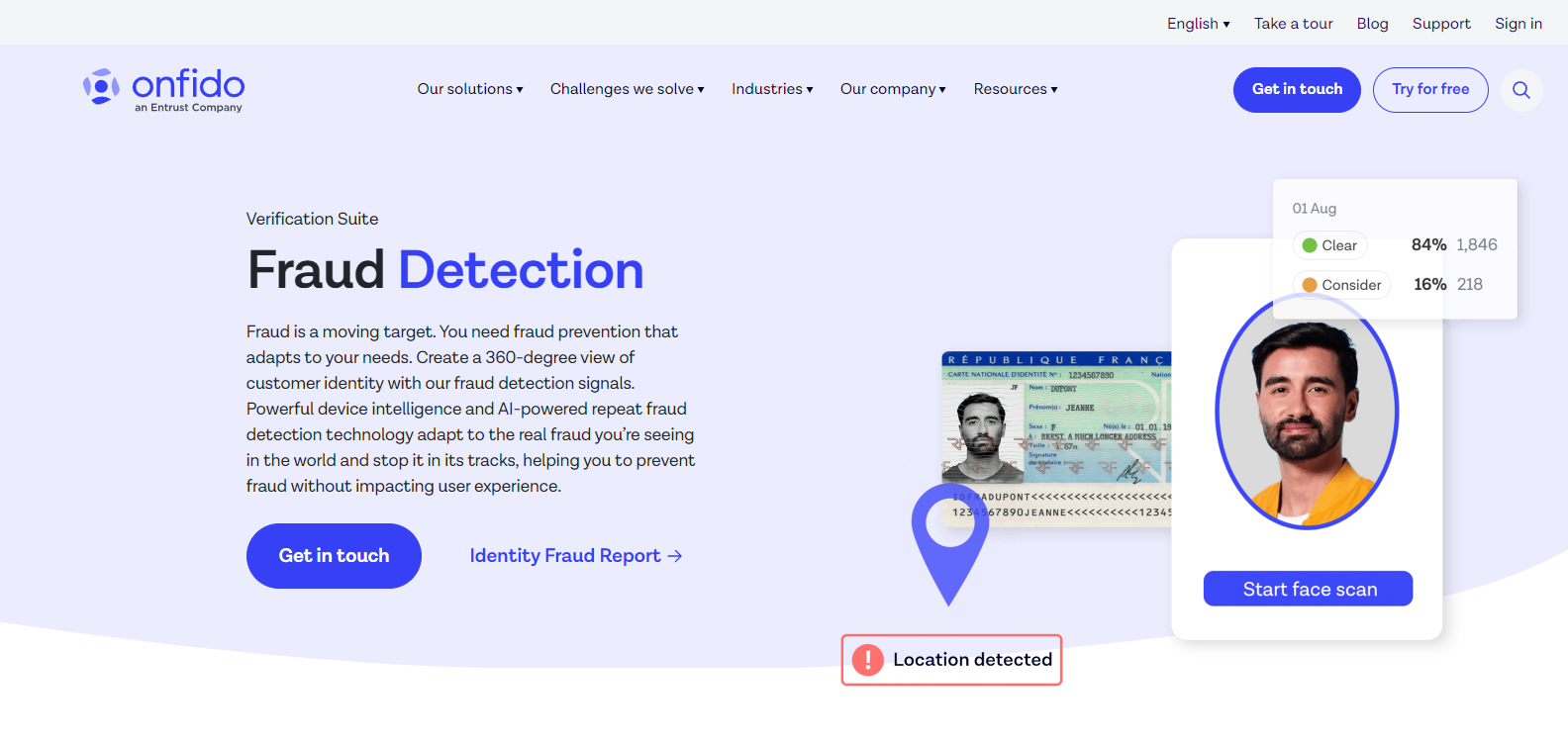
Onfido is a fraud detection solution that leverages biometric analysis and artificial intelligence to help businesses prevent fraudulent activities.
Onfido utilizes facial recognition technology to compare a user’s live photo with their identity document. The platform is capable of verifying a wide range of documents, including passports, driver’s licenses, and ID cards from various countries, and it can detect any tampered or counterfeit documents. Onfido’s machine learning algorithms analyze data points on identity documents to identify patterns and anomalies indicative of fraud. The system ensures that the identity verification process involves a real person present at the time of verification. Additionally, Onfido provides a risk score for each verification, enabling businesses to make informed decisions. By offering a thorough verification process that meets global compliance standards, Onfido helps businesses comply with KYC and AML regulations.
By combining these technologies, Onfido helps businesses to enhance their security measures and protect against identity fraud.
Shufti Pro
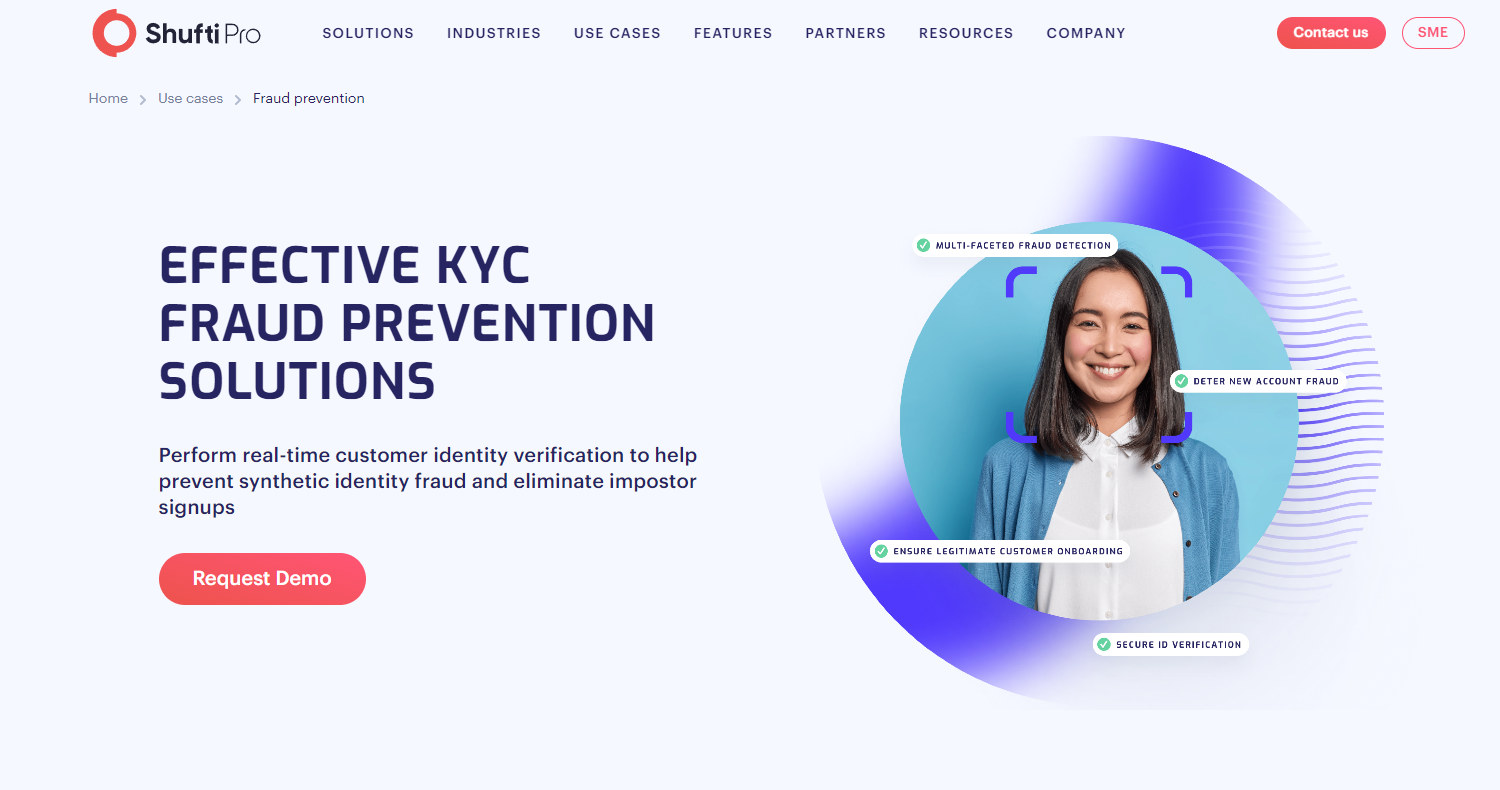
Shufti Pro verifies the identities of individuals using government-issued IDs, ensuring that only legitimate users can perform transactions. The system checks the authenticity of various documents, detecting any forged or doctored identification papers. Shufti Pro’s face verification technology allows for the comparison of a live selfie with the photo on an ID document. Additionally, the platform screens individuals against global watchlists to prevent financial crimes. Businesses can tailor Shufti Pro’s verification processes to fit their specific needs and risk tolerance.
By focusing on these aspects, Shufti Pro assists businesses in reducing the risk of fraudulent activities, safeguarding their operations, and maintaining regulatory compliance.
Trulioo
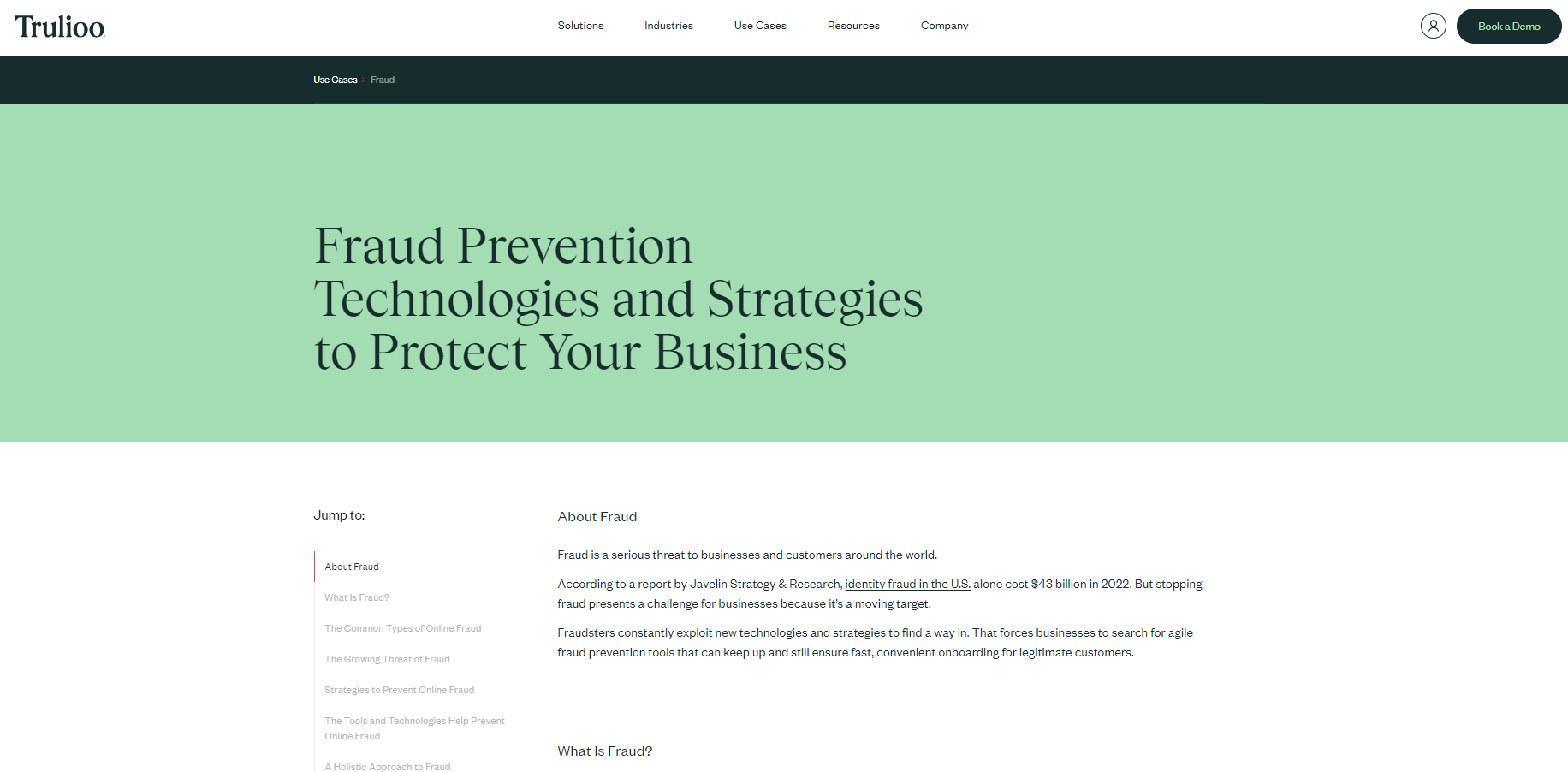
Trulioo is a platform designed to verify identities globally by drawing information from a variety of data sources. It offers the capability to check the authenticity of ID documents and incorporates facial recognition technology to ensure that the person making a transaction is the rightful owner of the identity being used. The system assists businesses in complying with AML (Anti-Money Laundering) and KYC (Know Your Customer) regulations by screening users against watchlists and providing thorough due diligence checks. Additionally, Trulioo provides analytics tools that help businesses understand and analyze patterns of illicit transactions.
Trulioo supports businesses in safeguarding their operations from fraudulent activities and ensures compliance with regulatory standards.
Riskified
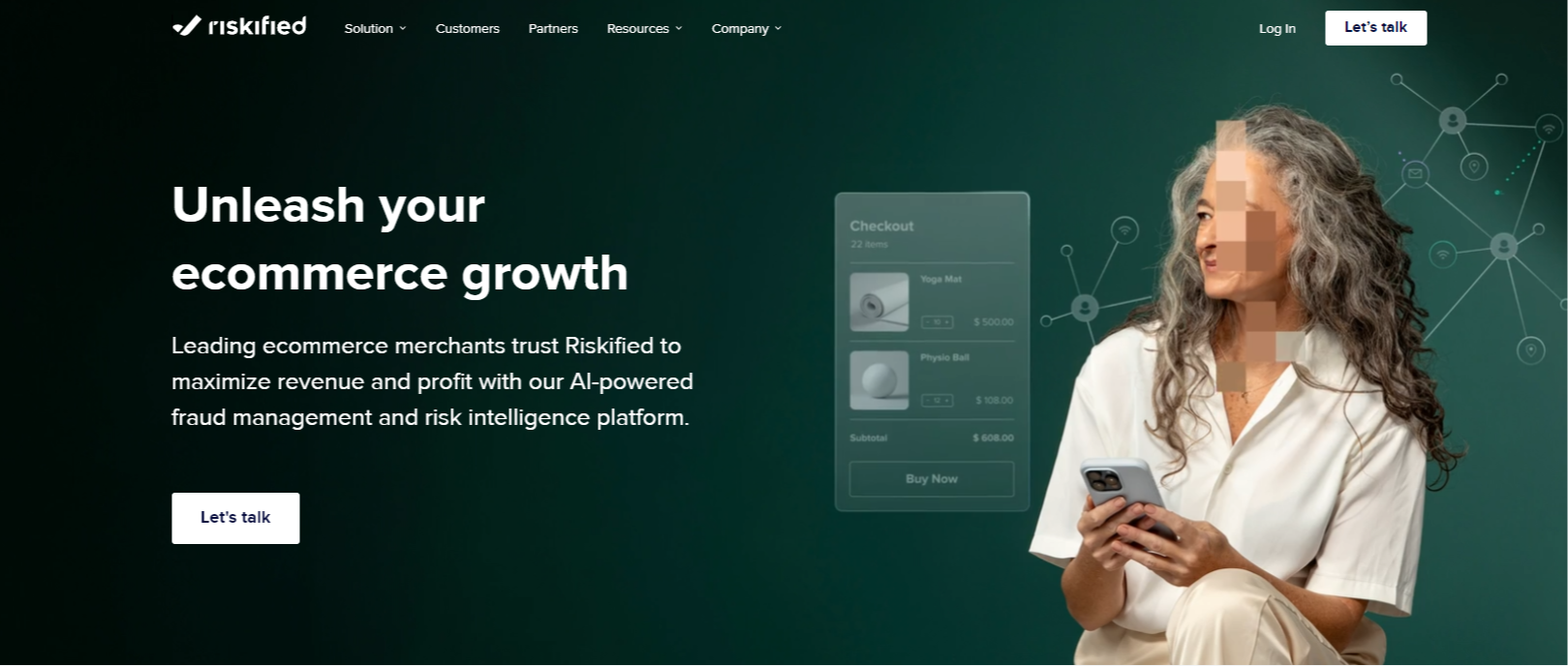
Riskified leverages advanced machine learning algorithms to analyze transactions and detect patterns of fraudulent activity. The platform offers a chargeback guarantee, taking on the liability for any approved transactions that later turn out to be fraudulent. By employing behavioral analytics, Riskified understands how users interact with the site, enabling it to provide real-time decisions. This allows businesses to approve transactions instantly, reducing cart abandonment. Additionally, businesses can customize Riskified's policies to align with their specific risk tolerance and fraud management needs.
These features enable businesses to minimize the risk of fraud, increase order approval rates, and improve the customer experience.
Sift
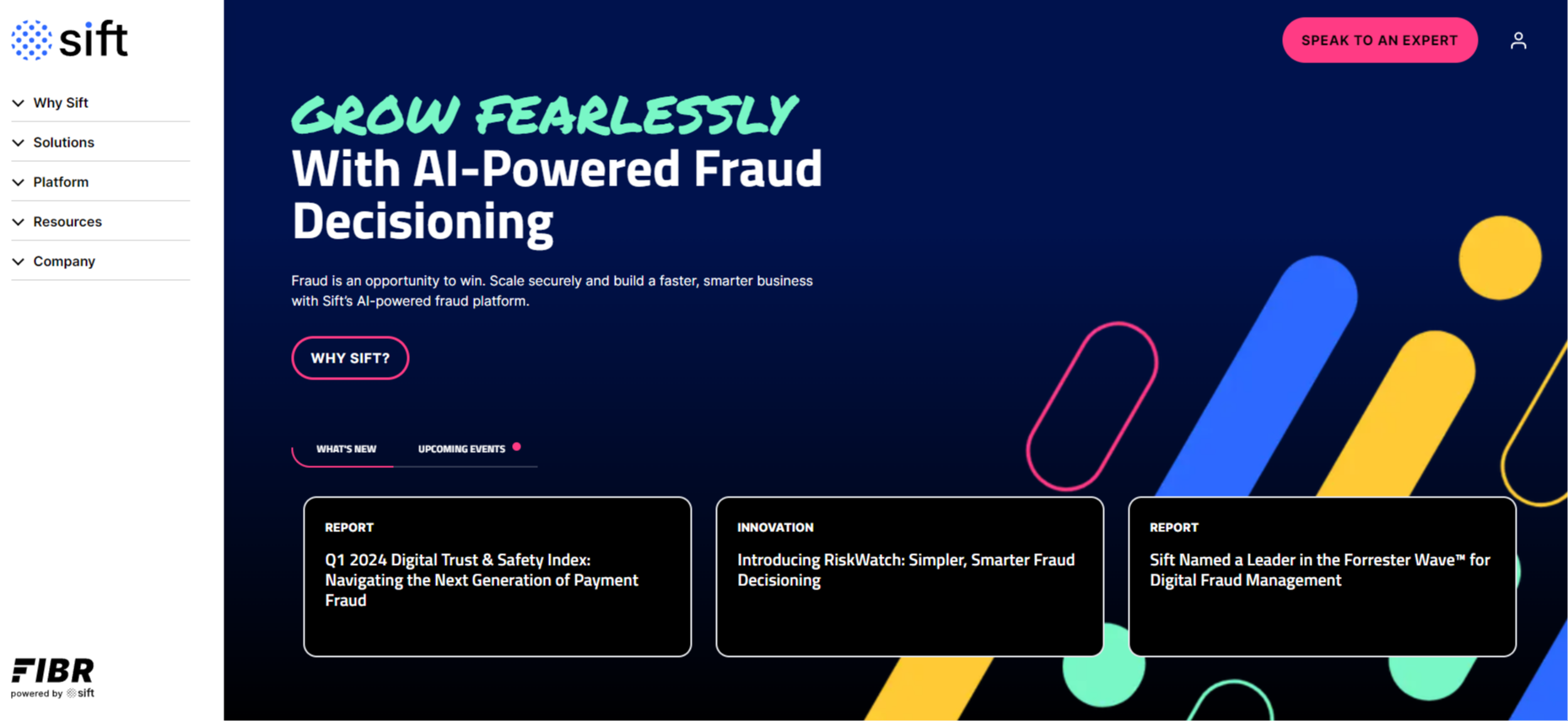
Sift is a digital trust and safety platform that offers a dynamic fraud detection solution tailored for online businesses.
Sift employs real-time machine learning models that adapt to evolving fraud patterns. The platform generates customizable risk scores for each user interaction, aiding businesses in deciding whether to accept, review, or decline transactions. Its solution includes identity verification tools to ensure users are who they claim to be. Additionally, Sift uses device fingerprinting to recognize devices associated with previous fraudulent behavior. Beyond payment fraud, Sift also helps businesses prevent account takeovers, content abuse, and promo abuse, contributing to a comprehensive fraud prevention strategy.
Sift helps businesses protect their platforms from fraudulent transactions and maintain a secure environment for their customers.
ArkOwl

ArkOwl’s fraud detection solution boasts a range of powerful features designed to safeguard businesses against fraudulent activities. Through advanced machine learning algorithms and real-time monitoring, ArkOwl identifies suspicious patterns and anomalies, providing proactive protection. Its intuitive interface simplifies fraud management, allowing users to effortlessly navigate through alerts and insights.
ArkOwl's comprehensive fraud detection capabilities extend beyond traditional methods, leveraging predictive analytics to anticipate emerging threats. Its adaptive approach continuously learns from data to enhance accuracy and effectiveness. Moreover, ArkOwl offers seamless integration with existing systems, ensuring minimal disruption to operations while maximizing security.
Kount
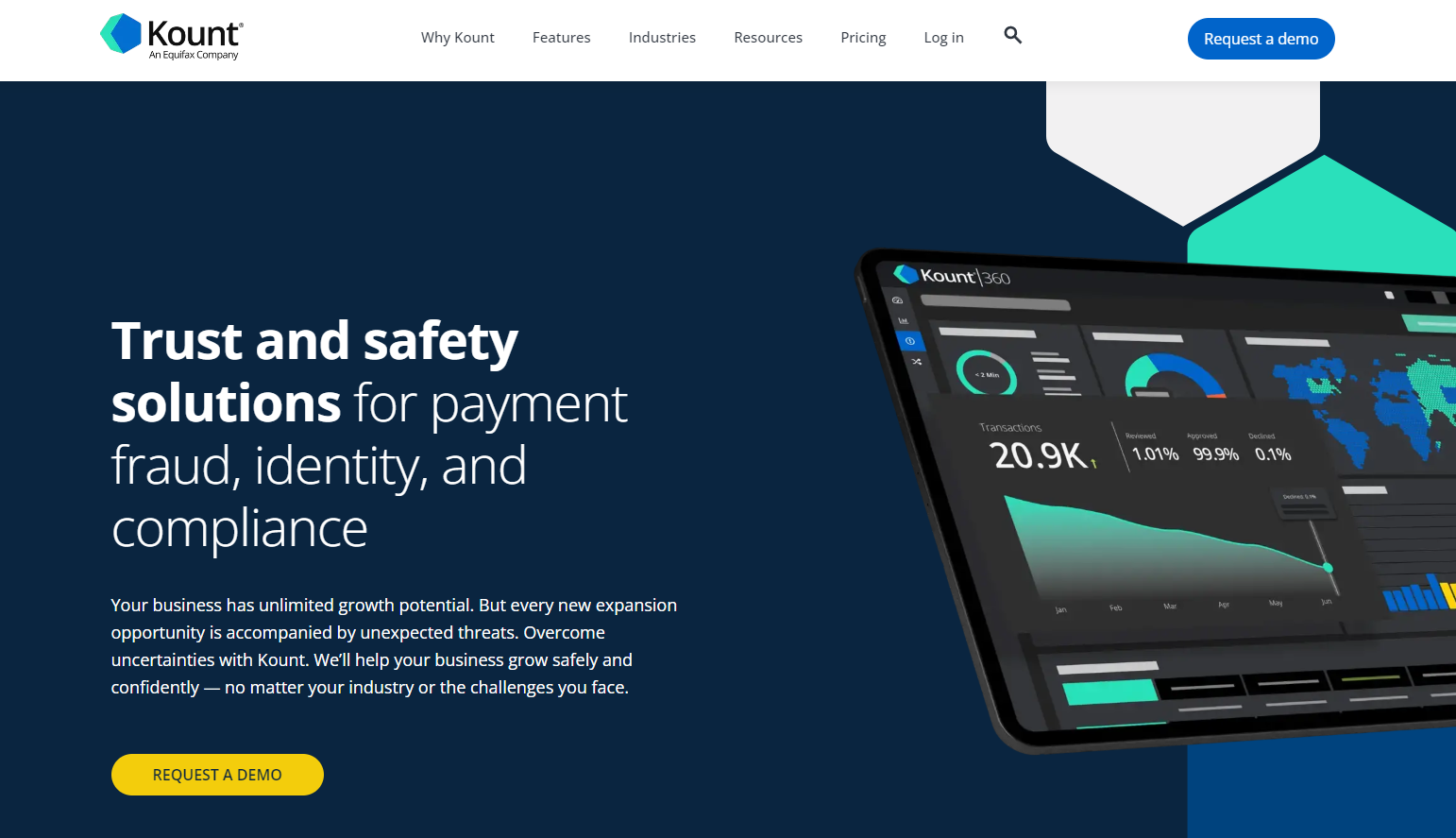
Kount utilizes advanced artificial intelligence to analyze transaction data and provide real-time fraud prevention decisions. The platform leverages a vast network of trust and fraud signals from billions of interactions to assess the risk associated with each transaction. By identifying and stopping fraudulent transactions before they result in financial loss, Kount helps businesses minimize chargebacks. Additionally, Kount provides fraud detection across various channels, including online, mobile, and in-store transactions, ensuring consistent protection regardless of how customers shop.
The system helps businesses minimize the risk of fraudulent activities, safeguard their revenue, and enhance the customer experience.
Signifyd
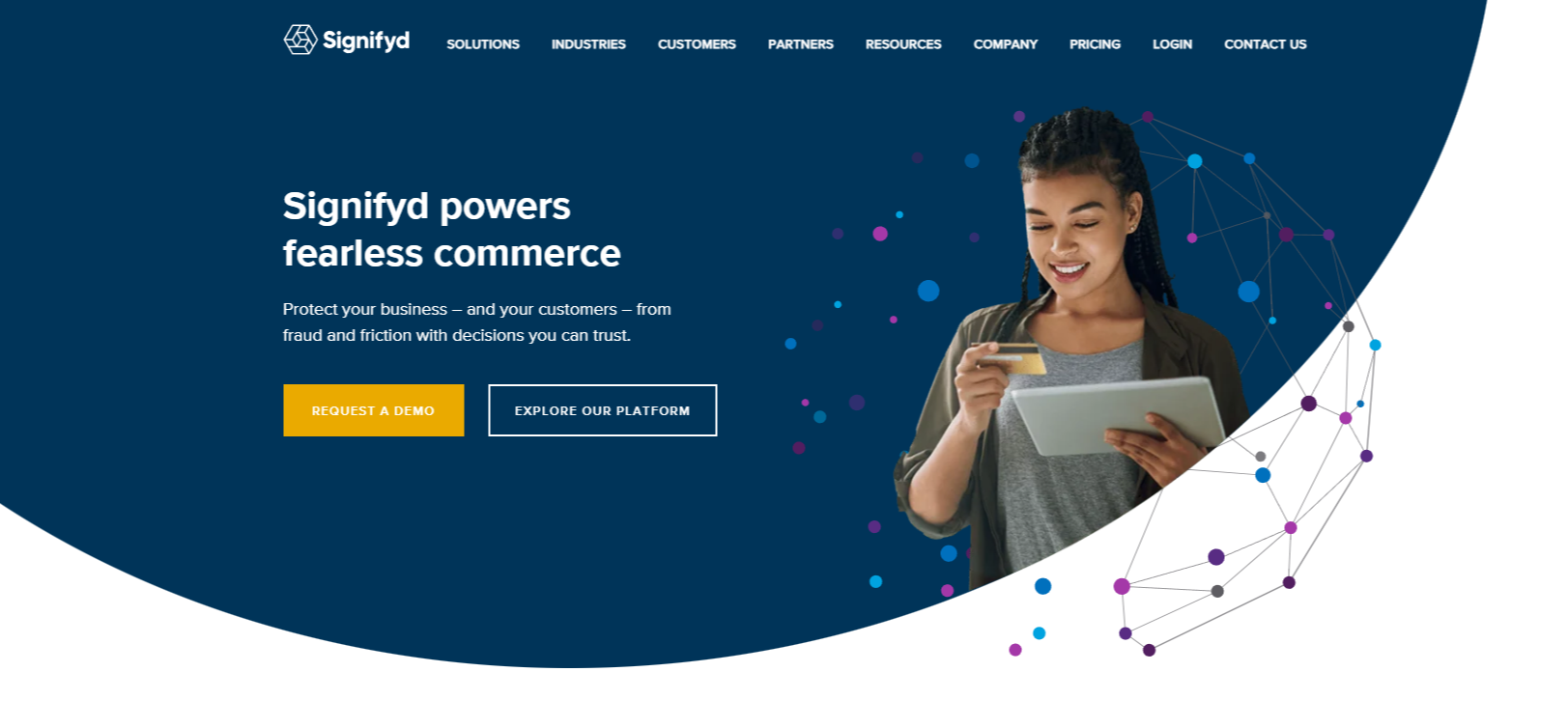
Signifyd leverages machine learning algorithms to automatically screen orders for fraudulent patterns, significantly reducing the need for manual review. The company provides a financial guarantee against fraudulent chargebacks, offering businesses financial security and peace of mind. Benefiting from a vast global data network that aggregates fraud signals from merchants worldwide, Signifyd’s platform excels in fraud prevention. Moreover, Signifyd assists businesses in recovering losses from chargebacks through its automated chargeback management system.
Using an effective combination of these features, Signifyd provides a comprehensive fraud detection service that helps online retailers minimize risk.
How to Choose the Right Fraud Detection Solution?
Choosing the right fraud detection solution is a critical decision that demands a comprehensive understanding of your company’s unique needs and the specific challenges you face in the realm of online security.
Firstly, it is crucial to evaluate the solution’s integration capabilities with your existing systems. A seamless workflow is paramount; the right fraud detection tool should integrate smoothly into your operations without causing disruptions or requiring extensive modifications to your current processes.
Secondly, consider the adaptability and scalability of the solution. Cyber threats are constantly evolving, and a robust fraud detection system must not only address current fraud trends but also be flexible enough to adapt to emerging threats. This means looking for solutions that leverage advanced technologies such as machine learning and artificial intelligence to continuously improve and stay ahead of fraudsters.
Additionally, the effectiveness of a fraud detection solution is often reflected in its track record. Investigate the solution’s performance history, looking for proven results and testimonials from other businesses. Case studies and success stories can provide valuable insights into the solution’s reliability, effectiveness, and the quality of customer support.
Moreover, consider the user experience offered by the fraud detection solution. An intuitive and user-friendly interface can significantly enhance your team’s ability to quickly identify and respond to fraudulent activities. Training and support are also vital; ensure that the provider offers comprehensive onboarding and ongoing support to help your team maximize the solution’s potential.
Finally, assess the cost-effectiveness of the solution. While it is important to protect your business from fraud, the solution should also be financially viable. Compare the pricing models and determine whether the solution provides a good return on investment by effectively reducing fraud-related losses.
By taking these factors into account, you can select a fraud detection solution that not only meets your immediate security needs but also aligns with your long-term operational goals and budget constraints. This thorough approach will help you safeguard your business against fraud while maintaining a smooth and efficient workflow.
Conclusion
The landscape of fraud detection solutions in 2024 is diverse and technologically advanced, offering businesses a range of tools to safeguard their operations. The top 10 solutions that we looked into show a dedication to creativity, usability, and flexibility in response to scammers' constantly changing strategies.
It is crucial to select a trustworthy fraud detection system because cyber threats are getting increasingly complex. Security must be given top priority by businesses, not simply to comply with regulations but also to build consumer trust. Through intelligent decision-making and system selection tailored to their unique requirements, businesses may maintain their prosperity in the digital economy and prevent fraudulent activities.
